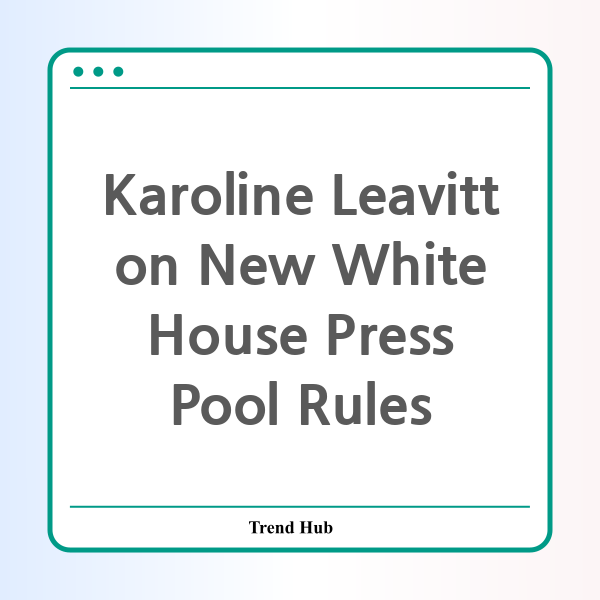* This website participates in the Amazon Affiliate Program and earns from qualifying purchases.

Are the days of traditional press access over? A significant shift is underway at the White House, with new measures being introduced to control which journalists have access to the president. As announced by Press Secretary Karoline Leavitt, the administration has decided that it will now determine the composition of the press pool, a change set to alter the dynamics of political journalism.
The previous system, managed by an association of White House correspondents, has governed press access for decades, ensuring a level playing field among various media outlets. However, the current administration asserts that the time has come for a fresh approach, one that promotes inclusivity and broader representation among news outlets.
Leavitt's announcement signifies a pivotal moment in the relationship between the White House and the media. In a briefing, she stated, "All journalists, outlets, and voices deserve a seat at this highly coveted table." This statement reflects a commitment to diversify the voices that report on presidential activities, potentially paving the way for newer and emerging media entities to gain a foothold in political coverage.
Historically, the press pool has been composed largely of established news organizations, but under the new guidelines, even smaller or lesser-known outlets will be granted the opportunity to participate. "Legacy outlets who have participated in the press pool for decades will still be allowed to join, but we will also be offering the privilege to well-deserving outlets who have never been allowed to share in this awesome responsibility," Leavitt remarked.
This change arises in the aftermath of a controversial decision to restrict a major news organization from pool events, citing resistance to a politically charged directive to rename a significant geographical feature. While the White House insists that this move is about expanding access, critics argue that it could be a tactic to silence dissenting voices and exercise control over media narratives.
Nevertheless, Leavitt reassured the public that the regular rotations among major television networks would remain in place, ensuring that the president’s messages reach a broad audience. The commitment to include diverse news sources aligns with a growing trend where audiences are demanding more representation in political coverage.
As we witness these developments, the implications for political coverage are profound. Will this open-door policy lead to a more enriched and varied discourse, or could it devolve into a system where only favorable coverage is highlighted? The answer to this question may define the future of political journalism and public trust in media.
While some speculate about the intentions behind these new rules, it is essential to analyze what this means for journalists and the public alike. An inclusive press pool could foster a more comprehensive understanding of presidential activities and policies, potentially bridging the gap between the government and citizens who seek truthful reporting. As the landscape of political journalism evolves, it will be crucial to keep a close watch on how these changes manifest in practice.
In conclusion, Karoline Leavitt's announcement marks a significant transition in White House media relations. As the administration takes the reins on press pool assignments, the question remains: how will this impact the future of news coverage in America?
* This website participates in the Amazon Affiliate Program and earns from qualifying purchases.